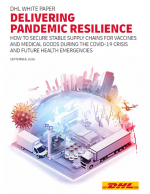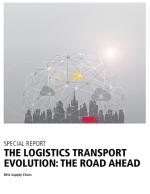Human-Centered Supply Chain - Delivered by DHL
This study identifies major challenges that fashion industry supply chains will face in the future as well as areas where action must be taken, and it also proposes various solutions.
DHL, the Council of Fashion Designers of America Inc. (CFDA) and the consulting firm Accenture have published a study on the future of fashion logistics entitled ’The Human-Centered Supply Chain’.
The study identifies major challenges that fashion industry supply chains will face in the future as well as areas where action must be taken, and it also proposes various solutions.
Crucially, it highlights that, in an increasingly digital world, humans will continue to play a critical role in the supply chain supporting the fashion industry.
The advent of new digital technologies will enable new forms of collaboration between fashion industry players and allow them to operate more flexibly, transparently and sustainably.
“The fashion industry is no longer what it was just a few years ago,” says Arjan Sissing, Senior Vice President Corporate Brand Marketing at Deutsche Post DHL Group.
“Digitalization and the resulting boom in e-commerce have helped supercharge the naturally fast-paced fashion business and its production and sales processes.” With today’s optimized supply chains, designers can now get their products to customers faster and more easily than ever and as a result boost their competitiveness in a cut-throat market environment.
The study is consciously designer-focused. “Agility will be crucial in the fashion logistics of the future,” says Sissing. “Traditional processes in fashion will soon be outdated for designers - instead, the industry will have to utilize interconnectedness, dialog and information flows.”
Fashion designers are thus becoming the central link in a supply chain consisting of agile networks and partnerships, one that is managed and monitored with digital tools.
The study identified four key areas in which digitalization and e-commerce have created new challenges and opportunities for designers.
- The first key area, ‘process ownership’, involves defining both clear and flexible processes that extend from purchase, through production to delivery. The importance of aspects such as transparency and sustainability also has to be communicated to partners and deliverers so that they too can become more transparent and sustainable in their business.
- The second area is ’relationship building’. The fashion industry has always primarily sustained itself on personal networks and contacts. Since cooperation and sharing of expertise and structures have become increasingly important to sustainable supply chains, the significance of relationships and partnerships has also continued to increase.
- ‘Brand operations’ are the third key focus. The establishment of an unambiguous brand is of major significance when it comes to working efficiently and presenting a consistent image to customers and suppliers. For fashion retailers, the supply chain must also form part of their brand story.
- The final core area is ’actionable information’, which consists of a constant flow of information between deliverers, designers and customers for the purpose of further optimizing processes and products and responding to customer demands. Insights from workshops with design students and established designers as well as interviews with supply chain partners for the fashion industry also informed the study.
What’s Related



Favorites





